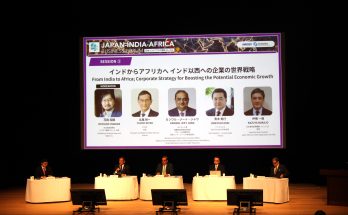Pitching for an equal regional representation in a reformed UN Security Council, India and Africa pushed for a stronger role for developing countries in the UN.
India’s Prime Minister Narendra Modi had said that India and Africa must speak in “one voice” to push UN Security Council (UNSC) reforms. Ten African leaders voiced their support for UNSC expansion, while some were open in their support for India, a majority of the 40 leaders present did not commit themselves about India’s candidature. “The UN ran the risk of becoming irrelevant unless it adjusted to the changing world,” Mr Modi said. “These institutions have served us well, but unless they adjust to the changing world, they risk becoming irrelevant,” added Mr Modi.
Elaborating on the uncertainty of the future, Mr Modi emphasised that we might have a more fragmented world that is less capable of dealing with the challenges of the present circumstances and “that is why India advocates reforms in global institutions.”
“This is a world of free nations and awakened aspirations. Our institutions cannot be representative of our world if they do not give voice to Africa, with more than a quarter of UN members, or the world’s largest democracy with one-sixth of humanity,” said Mr Modi.
“We reaffirm our strong commitment for a comprehensive reform of the United Nations system, including its Security Council, to make it more regionally representative, democratic, accountable and effective,” said the joint statement, entitled Delhi Declaration 2015.
Joining India in strongly pitching for UN reforms, Zimbabwe President Robert Mugabe was critical of the treatment of the West towards Africa. “African nations have been treated as ‘underdogs’ and looked down upon as ‘dwarfs’ by the permanent members of UNSC,” Mr Mugabe said. He insisted that the reform of the global body should be carried out in such a way that it becomes ‘United Equal Nations’.
Supporting India’s candidature in a reformed Security Council, Mr Mugabe said, “We are saying let us amend the charter of UN.” He elaborated further by saying that there should be two seats for African countries in the reformed Security Council and one for India.
South African President Jacob Zuma also strongly backed India’s candidature for the UNSC seat.
Abdel Fattah Al-Sisi, President of Egypt said, “the developing countries should get their rightful place in the international bodies, and efforts should be made to remove the injustice.” Egypt is part of the United for Consensus, a group including Pakistan that opposes India’s candidature and the other aspirants of the G4 countries.
African leaders from nations like Senegal, Niger and Lesotho, however, did not make categorical commitment for India’s quest for a permanent seat.
Author Profile
- India Writes Network (www.indiawrites.org) is an emerging think tank and a media-publishing company focused on international affairs & the India Story. Centre for Global India Insights is the research arm of India Writes Network. To subscribe to India and the World, write to editor@indiawrites.org. A venture of TGII Media Private Limited, a leading media, publishing and consultancy company, IWN has carved a niche for balanced and exhaustive reporting and analysis of international affairs. Eminent personalities, politicians, diplomats, authors, strategy gurus and news-makers have contributed to India Writes Network, as also “India and the World,” a magazine focused on global affairs.
Latest entries
 DiplomacyJanuary 5, 2026India walks diplomatic tightrope over US operation in Venezuela
DiplomacyJanuary 5, 2026India walks diplomatic tightrope over US operation in Venezuela India and the WorldNovember 26, 2025G20@20: Africa’s Moment – The Once and Future World Order
India and the WorldNovember 26, 2025G20@20: Africa’s Moment – The Once and Future World Order DiplomacyOctober 4, 2025UNGA Resolution 2758 Must Not Be Distorted, One-China Principle Brooks No Challenge
DiplomacyOctober 4, 2025UNGA Resolution 2758 Must Not Be Distorted, One-China Principle Brooks No Challenge India and the WorldJuly 26, 2025MPs, diplomats laud Operation Sindoor, call for national unity to combat Pakistan-sponsored terror
India and the WorldJuly 26, 2025MPs, diplomats laud Operation Sindoor, call for national unity to combat Pakistan-sponsored terror








